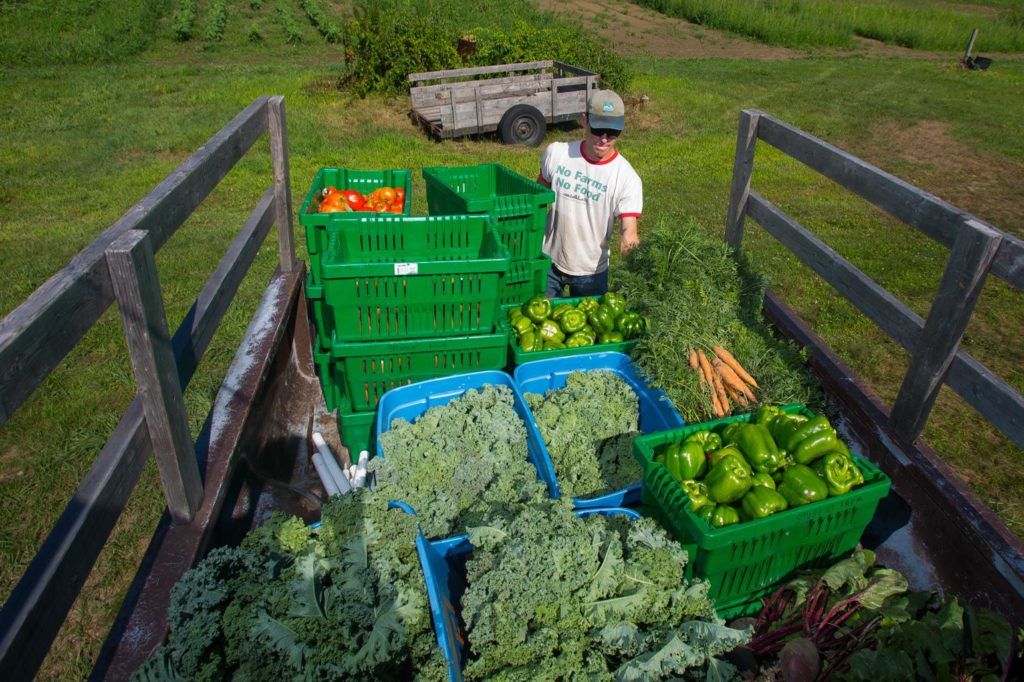DESPITE VIRUS, UMASS AMHERST STUDENT FARMS CONTINUE TO PRODUCE ORGANIC LOCAL FOOD

UMass Student Farm. Photo: umass.edu
Source: UMass News and Media
Farmers, well known for keeping an eye to the sky and adapting to whatever nature brings, are adjusting to new realities with COVID-19, and the University of Massachusetts Amherst’s Student Farming Enterprise at the Agricultural Learning Center (ALC) is no exception, says director and senior lecturer Amanda Brown.
The Stockbridge School of Agriculture’s student farming program manages 26 acres and grows certified organic produce on a combined 12 acres at two locations – the UMass Research and Education Farm in South Deerfield and the newer ALC, a teaching facility and outdoor classroom just north of campus in Amherst.
Each spring, accepted students enroll in a 3-credit lecture and 3-credit farm practicum where they develop a complete farm plan and gain hands-on training in food production. Most have never worked on a farm, driven a tractor or planted a field, Brown notes. In the fall semester, students take another 3-credit lecture and 3-credit practicum with a focus on harvest, marketing and financial analysis.
This year, since mid-March “student labor is non-existent,” she adds, but a handful of essential staff have kept both farms operating. They hope students may be able to return in July for planting fall crops and harvesting about 30 vegetables such as corn, tomatoes, peppers, carrots, parsnips, beets and broccoli.
Brown says that before campus closed and remote learning began, students were able to complete their farm plan and harvest goals, production and marketing plans, planting maps and seed orders. With those and other essential steps completed in person, Brown says, “We’ve been able to continue with zoom meetings and to adjust the farm plan, which is what all farmers do. This year, we’ve gotten really good at it.”
A normal summer for 6-10 student field workers would begin on the Monday after Commencement, Brown says, with planting early crops such as 13,000 onions, 6,000 potatoes, leeks and winter squash. She and the staff have already put those in the ground.
This month at the ALC, staff also plowed and prepared ground next to acres of hay, a Silvopasture plot with more than 100 chestnut trees and seven sheep grazing among them, some chickens, a small apple orchard and vineyard. The State Apiary at the ALC offers a farm pollinator habitat conservation project with education, demonstrations and research on agricultural sustainability, pollination, honeybee health and hive management.
Going forward, the director adds, “We hope that though the experience may look different for our students, it will at least continue. We have food, people need food, and we’re going to grow that food. I feel the current emergency situation illustrates very well the importance of local food to our health and economy.”
Further, “I’m really impressed with how the students have adapted to the new reality with grace and maturity. They have risen to the occasion and adjusted, which is the heart and soul of farming. They’re learning a real farming skill set. Adapting and adjusting is what farmers do all the time.”
Equally impressive, Brown says, it how students have learned that they need and deeply value the community they have created and the support it gives. Zoom meetings have been “the highlight of our weeks,” Brown says. Student farmers post regular updates on social media and the UMass Community Supported Agriculture (CSA) website with such features as “A Day in the Life of a Farmer” and “Farmer of the Week.”
CSA share sales are down this spring, Brown says, “But we are still selling shares to students, faculty and staff. All profits go back into the program for next season.” The farm has a Commonwealth Quality food safety certificate and “we have always run a very sanitary operation. We are open for business and will continue to sell shares with distribution to begin in early September.”
